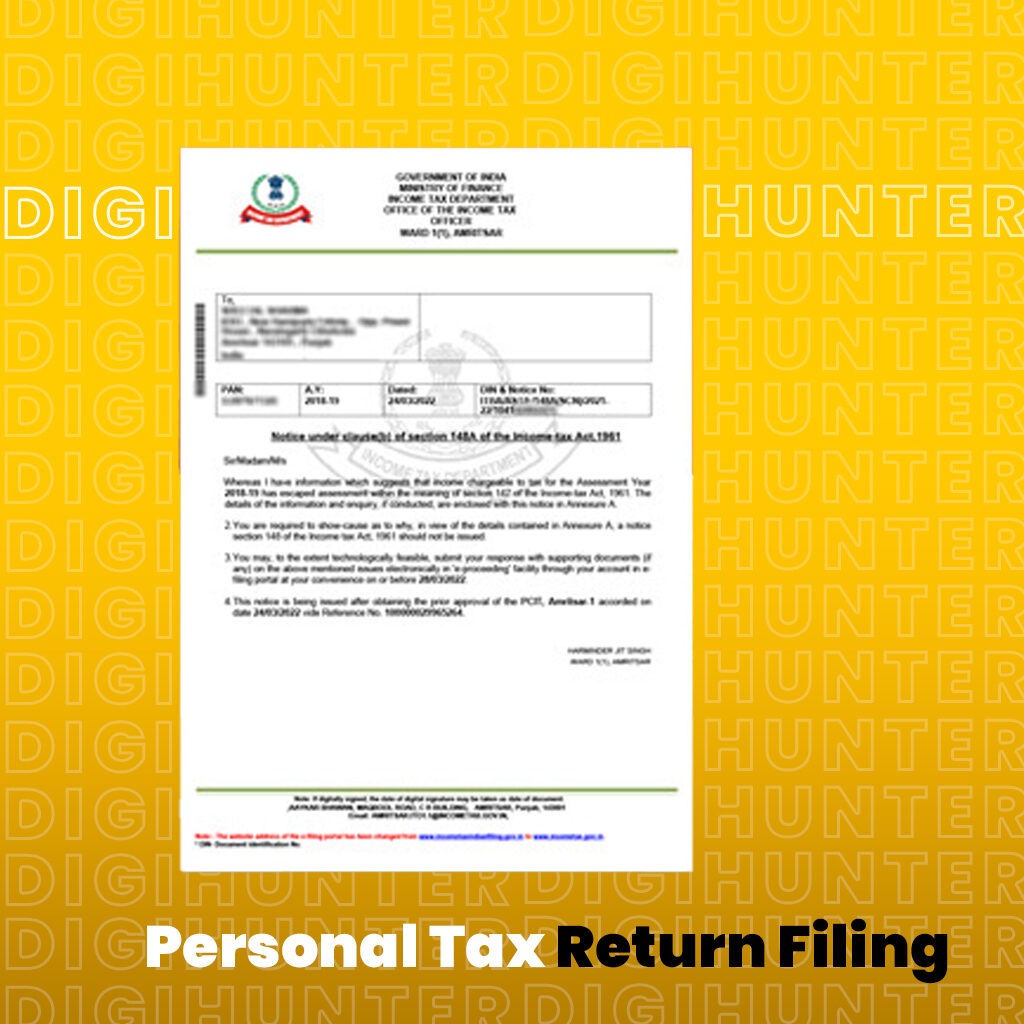Personal Tax Return Filing

Personal Tax return filing for an individual with salary income.
(ITR eFiling) Income Tax Filing
Its is mandatory for individuals, NRIs, partnership firms, LLPs, companies and Trust to file income tax returns each year. Individuals and NRIs are required to file income tax return, if their income exceeds Rs.2.5 lakhs per annum. Proprietorship firms and partnership firms are required income tax return – irrespective of amount of income or loss. All companies and LLPs are mandatorily required to file income tax return, irrespective of turnover or profit. DigiHunter provides income tax efiling services with dedicated Tax Expert support. Upload your Form-16, sit back and relax. Our experts will file your income tax return and provide you the acknowledgement within 1 – 2 business days.
Penalty for Late Filing Income Tax Return
Taxpayers who do not file their income tax return on time are subject to penalty and charged an interest on the late payment of income tax. Also, the penalty for late filing income tax return on time has been increased recently. The penalty for late filing income tax return is now as follows:
- Late Filing between 1st August and 31st December – Rs.5000
- Late Filing After 31st December – Rs.10,000
- Penalty if taxable income is less than Rs.5 lakhs – Rs.1000
Income Tax Return Due Date
The due date for income tax return filing is 31st July of every year for individual taxpayers. The due date for income tax return filing for companies and taxpayer requiring tax audit is 30th September. Section 44AD of the Income Tax Act deals with tax audit under Income Tax Act.

Business
In case of a business, tax audit would be required if the total sales turnover or gross receipts in the business exceeds Rs.1 crore in any previous year.
Professional
In case of a profession or professional, tax audit would be required if gross receipts in the profession exceeds Rs.50 lakhs in any of the previous year.
Presumptive Taxation Scheme
If a person is enrolled under the presumptive taxation scheme under section 44AD? and total sales or turnover is more than Rs. 2 crores, then tax audit would be required.
Penalty for late filing income tax return has been increased to Rs.5000 for returns filed between 1st August and 31st December.
Due dates for filing the GST returns
Section 80C Deduction
Income tax deduction of upto Rs.1.5 lakhs can be claimed on amount paid or deposited in PF, PPF, LIC premium paid, National Savings Certificate, ULIP, principal part of repayment of housing loan, tuition fees paid for children, term deposit in bank, deposit in Senior Citizen savings scheme and more.
Section 80D Deduction
Section 80D deduction can be claimed by individuals and HUF for payments to medical insurance paid by cheque under GI scheme. Also fees of upto Rs.5000 paid for preventive health checkup can be claimed as income tax deduction under Section 80D.
Section 80EE Deduction
Additional deduction under Section 80EE can be claimed on interest on housing loan paid through EMI by the assessee. The maximum deduction allowed under Section 80EE is Rs.1 lakh. The deduction can be availed on the first home loan, the amount of loan does not exceed Rs.35 lakhs and the property value does not exceed Rs.50 lakhs.
Section 80E Deduction
Section 80E deduction can be claimed by individuals for repayment of interest on loan taken in respect of higher deduction. The amount of interest paid can be claimed as a deduction under Section 80E. The maximum period for which this deduction can be availed is 8 years starting from repayment of loan or till the entire loan is repaid, whichever is earlier.
Section 80G Deduction
Section 80G deduction can be claimed on donations to certain funds, charitable institutes within the ceiling amount of 10% of the Gross Taxable Income. The amount of deduction available would depend on the exemption enjoyed by the fund. Section 80G deduction cannot be claimed for cash deductions of more than Rs.2000.
FAQ's
Individuals, NRIs, partnership firms, LLPs, companies and Trusts are supposed to file Income Tax Returns every year.
ITR-1 form can be used by Individuals who have less than Rs.50 Lakhs of annual income as salary or pension and have one house property only.
Yes, taxpayers who do not file their Income Tax Return on time are subject to penalty and charged an interest on the late payment of income tax. The penalty for late filing has been increased recently.
ITR-3 form must be filed by professionals or people who are operating a proprietorship business in India.
ITR-5 form is filed by partnership firms, LLPs, associations and body of individuals to report their income and computation of tax.
In addition to registration or incorporation, a business may require other registrations depending on the business activity undertaken. Talk to an Advisor to find out registrations your business may require post registration.
Popular Products
Sole proprietorship | One Person Company | Nidhi Company | Company Registration | Tax Notice | Indian Subsidiary | HSN Code | Section 8 Company | Trademark Search | USA Company Registration | FSSAI Registration | Import Export Code | ESI Registration | GST Return Filing | Patta Chitta | PF Registration | Payroll | Business Tax Return Filing | PF Return Filing | Eway Bill | GST Registration | TDS Filing | Udyam Registration | Trademark Registration | Startup India Registration | Professional Tax | Personal Tax Filing .
Our Services in
Andhra Pradesh | Arunachal Pradesh | Assam | Bihar | Chhattisgarh | Goa | Gujarat | Haryana | Himachal Pradesh | Jammu and Kashmir | Jharkhand | Karnataka | Kerala | Madhya Pradesh | Maharashtra | Manipur | Meghalaya | Mizoram | Nagaland | Odisha | Punjab | Rajasthan | Sikkim | Tamil Nadu | Telangana | Tripura | Uttar Pradesh | West Bengal.






